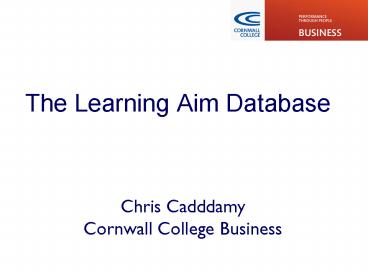The Learning Aim Database - PowerPoint PPT Presentation
1 / 17
Title:
The Learning Aim Database
Description:
The National Database of Accredited Qualifications (NDAQ) Free online ... definitive, up-to-date information on all nationally accredited qualifications ... – PowerPoint PPT presentation
Number of Views:26
Avg rating:3.0/5.0
Title: The Learning Aim Database
1
The Learning Aim Database
- Chris Cadddamy
- Cornwall College Business
2
The Learning Aim Database
- The LAD holds data for three teaching years
- Contains information about all LSC-recognised
learning aims - It includes learning aim information as well as
funding and statistical data
3
The Learning Aim Database
- The information in the LAD is updated monthly
- Aims are added/amended based on details received
from a variety of sources - DfES
- QCA
- Awarding Bodies
- You could consider subscribing to the LSC web
alerts service - http//www.lsc.gov.uk/news/lscwebalerts/
4
The Learning Aim Database
- http//providers.lsc.gov.uk/LAD/default.asp
5
The National Database of Accredited
Qualifications (NDAQ)
- Free online database of nationally accredited
qualifications, units and recognised awarding
bodies - The only database that provides concise,
definitive, up-to-date information on all
nationally accredited qualifications - used by learners, employers, awarding bodies,
training providers, schools, colleges, government
agencies, regulatory partners and funding
agencies User-friendly and accessible providing
online help, support and a full search facility
6
The National Database of Accredited
Qualifications (NDAQ)
- http//www.accreditedqualifications.org.uk/index.a
spx
7
Awarding Bodies
- A body approved by a recognised agency (Ofqual)
for the purpose of certificating learners
achievement - Ofqual approves all new awarding bodies and
qualifications.
8
Examples of Awarding Bodies
- City and Guilds
- Edexcel (BTEC)
- OCR
- AQA
- NCFE
- CITB
- HAB
- LANTRA
- GQA
9
(No Transcript)
10
key Organisations
- Sector Skills Councils
- Learning and Skills Council
- Awarding Bodies
- Ofqual
- Business Link
11
Ofqual
- Ensure that the whole qualifications system has
integrity - Ensure that the awarding organisations that offer
and deliver qualifications have good systems in
place, and that they are held to account for
their performance - Ensure that the qualifications market provides
value for money and meets the needs of learners
and employers - Monitor standards in qualifications, exams and
tests, and reporting on our findings - As a regulator, we step in and exercise our
regulatory authority where there is a risk to the
integrity of the system or to a learner. We aim
to be consistent in our decision-making and to
make our decisions clear and understandable. - http//www.ofqual.gov.uk/
12
New Qualifications
- Identify the need and demand
- Identify key partners
- Identify cost
- Approach Awarding Body (regional office)
- Approach Sector Skills Council
- Has to be approved by Ofqual
- Once approved and developed it will be published
on - The National Database of Accredited
Qualifications (NDAQ) The LAD Funding
13
Key Points for Consideration
- Is there an existing qualification or unit I
could use or map to ? - NDAQ
- Credibility and cost of development
- Have I got time
14
Another Way ?
- EDEXCEL Customised Framework
- The BTEC Customised Framework allows centres to
respond to specific requirements for a particular
local need for a group of people or an industry
and gain BTEC accreditation and certification - Centres are able to create their own customised
BTEC short courses - Qualification sizeThe BTEC Customised Framework
offers the choice to develop varying sizes of
short course qualification as follows - BTEC Award 10 - 100
hours Entry to Level 8BTEC
Certificate 120 - 200 hours Entry to
Level 8BTEC Diploma 220 - 300
hours Entry to Level 3BTEC
Diploma 220 hours and above Level 4
to Level 8 - Unit sizeThe smallest unit size consists of 10
guided learning hours. Unit sizes can be any
multiple of 10 to a maximum size of 120 guided
learning hours - http//www.edexcel.org.uk/quals/customised/
15
Funding 08/09
2007/08
2008/09
- Training
16
Train to Gain
- Training
- Relevant to the learners job
- Must be a full Level 1,2,3,4 or Basic Skills
- The Learner
- Be working for an employer under a contract of
employment - Be working as a volunteer for an employer
- Be Self Employed
- The Employer
- Any Size
- Not be a central Government Department
17
Train to Gain
- Full Level 2
- Fully funded as long as they have not got a full
level 2, sector priority qualifications fully
funded for second level 2. - Full Level 3
- Fully funded first level- 3 for learners aged
19-25, fully funded if no previous level 2 held.
First and Second Level 3 full funding only
available for Sector Compact Qualifications. - Basic Skills
- Literacy / Numeracy fully funded
- ESOL co-funded
- Full Level 4
- Co funded































